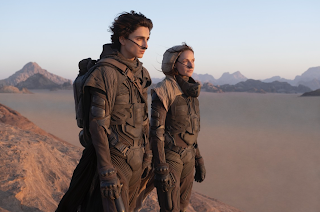 |
| Timothée Chalamet and Rebecca Ferguson in "Dune" Photo Credit: RottenTomatoes.com |
When discussing science-fiction literature, you always have to bring up Frank Herbert’s 1965 novel, “Dune.” It’s one of the most epic journeys a reader could enjoy, bringing you to unforgettable locales and immersing you in a wide array of characters. Over the decades, there have been a few attempts to bring Herbert’s vision to film and television, but it never quite worked out. The most-notable attempts came from David Lynch, who wrote and directed a film adaptation in 1984, and from John Harrison, who wrote and directed a three-part miniseries in 2000, neither of which were able to capture the scope and essence of Herbert’s source material. There’s even a documentary called “Jodorowsky’s Dune,” which chronicles Alejandro Jodorowsky’s attempt at adapting the film in the mid ‘70s.
However, the time has come when we finally have an adaptation that’s worthy of the novel’s legacy, thanks to director and co-writer, Denis Villeneuve. After gifting us with two of the best sci-fi movies of the 2010s, “Arrival” and “Blade Runner 2049,” he delivers a stunning part-one to his duology.
In the year 10191, Duke Leto I (Oscar Isaac) of House Atreides rules over the ocean planet of Caladan, and is soon given the opportunity to be a fief ruler on the desert planet of Arrakis, the only source of “spice,” a rare substance that increases human vitality and is used for interstellar travel. When he and his partner, Lady Jessica (Rebecca Ferguson), and their son, Paul (Timothée Chalamet) move to their new home, they will find out that there are ulterior motives for the family’s new assignment.
The film has an extensive and talented cast, with Chalamet, Ferguson, and Isaac being at the hart of it. Isaac has a steadfastness and regality to him that shows a competent ruler, while also expressing his love and dedication to doing what’s best for his family. Meanwhile, the scenes that Chalamet and Ferguson share offer most of the film’s emotional heft in the later half of the movie. They both show the hardship of the burdens that their characters experience, with Paul trying to come to terms with being the possible savior of Arrakis, and Lady Jessica knowing that she’s the reason for what Paul is going through.
As for the rest of the cast, everyone in the ensemble commits to their part, whether they’re in it for an ample amount of time or just a couple of scenes. With a cast that includes Josh Brolin, Dave Bautista, Zendaya, Stephen McKinley Henderson, David Dastmalchian, Cheng Chen, Sharon Duncan-Brewster, Charlotte Rampling, Jason Memoa, and Javier Bardem, they each make sure that you’ll remember them. However, out of all of them, Stellan Skarsgård leaves the biggest impression as the villainous Baron Vladimir Harkonnen. There’s a slimy sinisterness to him that makes his antagonist so enticing to watch, and you’ll surely be excited to see what he has coming in part two.
The screenplay by Villeneuve, Jon Sphaits, and Eric Roth does a remarkable job of maintaining the out-there essence of the book, all while removing anything that’s not necessary, which results in a narrative that will satisfy fans of the novel, but will also be accessible to newcomers. There’s quite a bit of setup when it comes to mapping out the mythology of this universe, but it’s nevertheless compelling. Between the amount of characters that have to be introduced and the worlds that have to be explored, you’re sure to be invested in how this story unfolds and how the social and political angles of the worlds with the movie will play out.
Given how many moving parts there are in this movie, it’s a terrific decision to have this film just cover half of the story. Because of this, all of the aspects of Herbert’s story that are introduced to us are provided with an opportunity to be explored in a detailed manner, never seeming like it’s rushing through anything.
Just as cinematographer Greig Fraser accomplished with Gareth Edwards’ 2016 film, “Rogue One: A Star Wars Story,” he has a talent for bringing majestic, otherworldly landscapes to audiences in which they can become immersed. He frames the worlds of Caladan, Arrakis, and Giedi Prime with such a vastness that you feel as though you’ve traveled through the screen and into these awe-inspiring locations. From the gorgeous greenery and oceans of Caladan to the harsh and unforgiving Arrakis to the bleak grayness of Giedi Prime, Fraser provides the camerawork that brings these places to monumental life. You’ll be opening your eyes as wide as you can in order to take it all in.
Villeneuve seems to go bigger with each movie that he helms, and “Dune” is everything that readers of the book could have imagined it would be. He does whatever he can to present Herbert’s novel in full realization, bringing the scope to the film that it deserves. From the larger-than-life landscapes as framed by Fraser, Patrice Vermette’s operatic production design, Jacqueline West and Robert Morgan’s eye-catching costumes, and Hans Zimmer’s beautiful, thunderous music, you can imagine that this is what Herbert saw in his mind when conceiving this iconic sci-fi story. Just like how Villeneuve overcame the immense challenge of creating a “Blade Runner” sequel 35 years after the original’s release, he has now risen above an even bigger challenge of crafting an adaptation of a novel that used to be seen as “unfilmable.” And, in doing so, he brings the scope and humanity that was seen in his “Blade Runner” sequel and “Arrival.”
Part two is set to be released in October 2023, and if part one was able to achieve what it did, I couldn’t be more excited to see what’s in store for the second installment.
Grade: A
No comments:
Post a Comment